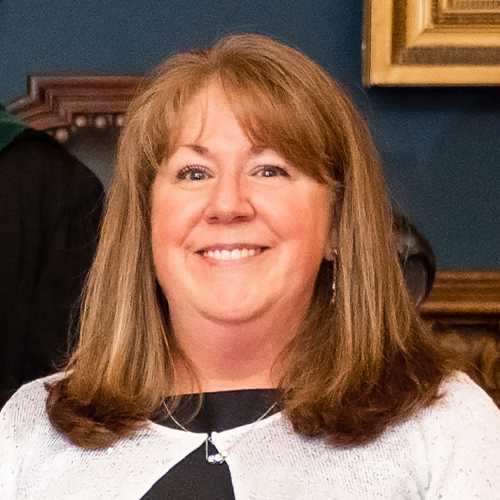Patricia M. Giordano
DO
Executive Director of Clinical Safety and Risk Management and Medical Safety Lead for Devices and Product Quality at Merck
Fellow Since 2020


Published November 2022
You currently serve as the Executive Director of Clinical Safety and Risk Management and are the Medical Safety Lead for Devices and Product Quality at Merck. Previously, you were at Johnson and Johnson for 14 years. Could you tell us about your path to Merck and what your day-to-day is like?
My path to Merck is actually a return to Merck. My family discouraged me from medical education, in favor of engineering, which was the path of other family members. Upon graduation from Drexel University as a chemical engineer, I set my sights on Merck, because they were innovative and were America’s most-admired company at the time. After four years in three manufacturing roles, which I thoroughly enjoyed, I left Merck to attend medical school and residency. After five years of private family medicine practice, I returned to industry with a desire to make a broader impact. I joined Johnson & Johnson and enjoyed fourteen years working in all three sectors supporting product safety. I rejoined Merck in 2018 for the opportunity to lead a group focused on devices and product quality, often situated at the intersection of medicine and manufacturing. It’s an area that many avoid, because of the ambiguity and complexity, but I’m just foolish enough to love it! I compare it to family medicine. At any moment, any system may need attention, whether planned or spontaneous. My team supports device and drug device combination product development and risk management, so we have a front row seat during design, user testing, and regulatory submissions. For all human health products, with or without a device component, we may be called to assess the patient risk associated with supply chain deviations or assist in the assessment of a customer complaint. The work requires us to understand the languages of medicine and manufacturing, while always keeping patient safety central to our purpose.
What first interested you about becoming a Fellow at The College of Physicians of Philadelphia?
The honor of Fellowship and being a small part of the history of The College of Physicians of Philadelphia was an initial attraction, but as I learn more I am drawn to the purpose and opportunity to contribute to a broader purpose, just as I sought in leaving private practice for industry. I am also interested in meeting other Fellows and learning from their paths. I look forward to participating in more face-to-face events.
Who is a physician or mentor that has influenced and inspired you?
Burton T. Mark, DO, was most influential in my medical education and training. I was diligent in my research before leaving my engineering career for medicine and was introduced to Dr. Mark as a respected Osteopathic Physician at Paoli Hospital where I was a volunteer at the time. Dr. Mark provided me with an honest, accurate portrayal of life as a physician, the challenges and rewards. He supported me in my application to the Philadelphia College of Osteopathic Medicine and became my student advisor. Dr. Mark has had an influence far beyond me. His student lectures in psychiatry primed each of us in the diagnosis and management of mental illness, especially for those of us in primary care practice. His advice was lifesaving when I took a part-time position in an emergency psychiatry facility, to lead with compassion and honesty rather than confrontation and force. His teaching also served me well in private practice with every form of patient encounter.
Tell us about one of your favorite items in the Library or Museum, or your favorite aspect of the College.
I love the focus on leveraging items and stories of the past to teach the next generations. I was intrigued by the Museum when pursuing my medical degree. I also admire the College’s endeavors to reach underrepresented groups and introduce them to the medical disciplines. There is an opportunity for community outreach that inspires me to participate.
What role(s) do you hope to see the College fill within our community in the coming years?
In my role as a family physician and in my role as a risk management physician, prevention and safety are central to my mission. When I look at the urban communities today compared to my residency years, I am most distressed by food insecurity and gun violence. I suspect these are symptoms of the same affliction. Both reflect a societal breakdown with no simple remedy. The College is well positioned to mobilize the best medical minds to partner with government and civic leaders towards a strategy and solution to rebuild communities.
As someone who has served in leadership roles for more than 20 years and has been active on Drexel University’s Alumni Board of Governors and BIOMED Executive Advisory Council, how do you stay motivated? How do you motivate members of your team and fellow Board members?
My motivation is always tied to a vision. It usually begins with a problem, or an unmet need. I want to be part of the solution. I tend to be patient and persistent, because I am satisfied by the promise of the vision. With experience I have learned that diversity of thought is an important ingredient in developing a vision. I am enriched and inspired by people who are very different from me. This is what I value most in activities as a Drexel Alumnus, and now as a Fellow.